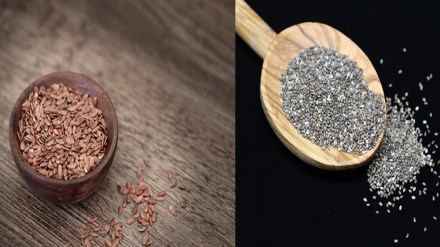Omega-3s have recently gained a lot of attention for their incredible health benefits, even in maintain the health of the brain and the heart. Many people associate omega-3 with the oil from fish or fatty fish like salmon and mackerel. However, consuming plant-based sources like flax and chia seeds is equally beneficial and accessible.
According to Dr Apurrva Sawant, Preventive Healthcare Expert, they contain a powerful punch, rich in alpha- linolenic acid, which is a type of omega-3 which plays a crucial role in one’s overall wellbeing.
What are omega-3 fatty acids?
Omega 3 fatty acids are known to be essential fats, meaning that our body cannot produce them by itself but needs to be obtained from food items. They are available in 3 primary forms-
EPA (eicosapentaenoic acid) and DHA (docosahexaenoic acid), are mainly found in fish and algae and are important for brain function and cardiovascular health. ALA (alpha-linolenic acid), is a plant-based omega-3 which is found in flax and chia seeds and serves as a precursor to EPA and DHA, even though only a small proportion of ALA gets converted into these forms in the body.
Despite this limited conversion, ALA provides one with several health benefits and flax and chia seeds are the best plant based sources available, Dr. Sawant said.
All you need to know about flax seeds
Flax seeds have been used for several years not only for their nutritional value but also for their therapeutic properties. These seeds are packed with omega-3s, fiber, and lignans which are plant-based compounds with antioxidant properties.
Benefits for brain health
Omega-3s are important for maintaining the structure and function of brain cells. ALA from flax seeds supports cognitive function, improves memory, and reduces the risk of neurodegenerative diseases like Alzheimer’s. Their anti-inflammatory properties help in combating chronic inflammation which is linked to cognitive decline and brain aging.
Benefits for heart health
Flax seeds are much known for their heart health benefits. Omega-3s decrease blood pressure, reduce bad cholesterol (LDL), and prevent plaque formation in the arteries, all of which reduces heart disease. The high fiber content in flax seeds also promotes heart health through its efficient digestion and regulation of blood sugar levels.
All you need to know about chia seeds
Like flax, chia seeds are also rich in ALA omega-3s, fiber, and other nutrients like calcium, magnesium, and antioxidants. These little black or white seeds have been staples of diets by ancient civilizations because there are good reasons for their inclusion in one’s food. They offer many health benefits with little exertion on our behalf.
Health benefits for brain
Omega-3 supplements provide steady intakes that prevent oxidative stress and inflammation in the brain, thus helping promote brain health. An ALA diet helps improve cognitive functioning; hence, it restricts age-related mental degeneration. The high amounts of antioxidants in chia seeds protect brain cells from damage by free radicals.
Cardiovascular benefits
The omega-3s in chia seeds are known to combat inflammation, which is the leading cause of heart disease. Intake of these seeds may help improve cholesterol by lowering LDL levels and increasing HDL levels. The fiber in chia seeds helps regulate blood sugar and supports a weight for a healthy cardiovascular lifestyle.
How to incorporate flax and chia seeds into your diet?
It is really easy and simple to add flax and chia seeds to your daily diet. Here are a few simple ways you can include seeds in your meal:
- Smoothie: Add flax or chia seeds into your morning smoothie for a nutritional boost.
- Oatmeal or Yogurt: Sprinkle one tablespoon of seeds over your oatmeal, yogurt, or cereal.
- Baking: Include grounded flax or chia seeds into your baked products such as muffins, breads, and pancakes.
- Salads: You can mix them into salad dressings or sprinkle them over your favorite salads.
- Chia Pudding: These can be soaked in milk or any dairy-free alternative and becomes a sweet and healthier version of the pudding.
“Despite being small, these seeds contain so much for health. They are excellent plant-based sources of omega-3 fatty acids that support the brain and heart health. And if you want to reduce inflammation, improve your cognitive performance, or promote cardiovascular health, then it would be a good addition to your diet,” Dr. Sawant said.
